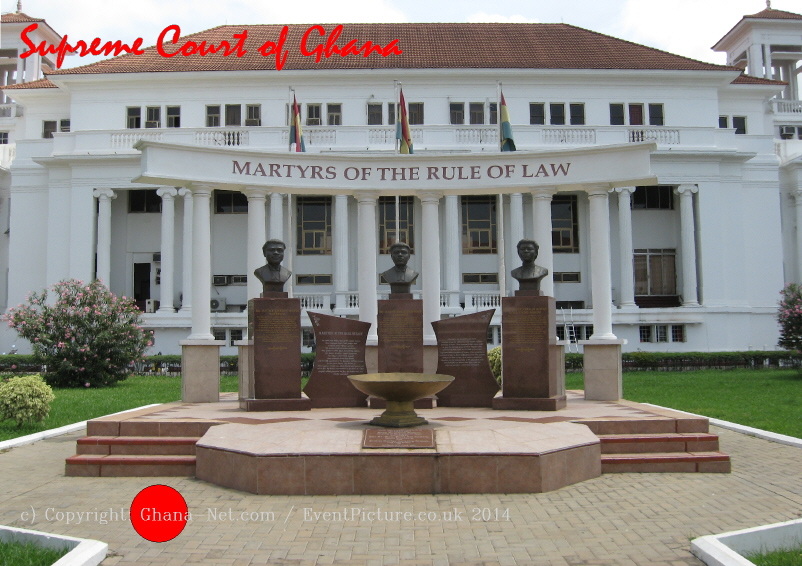Source: classfmonline. com - The Supreme Court, per its unanimous ruling on the struggle between the Progressive People’s Party’s Dr Papa Kwesi Nduom and the Electoral Commission, over the former’s disqualification from the 2016 presidential race, has shown the Electoral Commission its real size, law lecturer at the Ghana School of Law, Maxwell Opoku Agyemang has said.
A 7-member Supreme Court panel presided over by Justice Sophia Adinyira, upheld a High Court ruling ordering the Electoral Commission to allow Dr Nduom, to get back into the presidential race.
The apex court on Monday, 7 November also ordered the EC to extend the nomination period for flag bearers to Tuesday, 8 November. It also directed the EC to give all parties a fair hearing to make the necessary corrections on their nomination forms.
It further ordered all High Courts to suspend any case before them in connection with the disqualification of other flag bearers.
Shortly after the ruling, Dr Papa Kwesi Nduom said: “I thank the judges, I thank God, I thank all our supporters, I thank everybody for your prayers and we are now going to work hard.”
He made these remarks on a campaign tour at Tatale in the Northern Region. Dr Nduom was earlier disqualified by the EC for not meeting the requirements needed for him to be considered as a presidential candidate for the December 7 polls but pursued the case in court and got a favourable ruling.
The EC resorted to the Supreme Court via a certiorari application to seek finality to the plethora of court cases filed against it by some of the 13 presidential nominees it disqualified over certain filing anomalies.
Prior to the certiorari application, the EC said in a statement after the High Court ruling that it had “completed a review of the judgment of the High Court, Accra dated 28th October, 2016 in the case of the Republic v Mrs. Charlotte Osei & Electoral Commission; Ex parte Dr. Papa Kwesi Nduom, numbered GT1401/2016. Having carefully studied the contents of the judgment, we respectfully disagree with the High Court judge’s decision on several essential legal and public policy grounds.”
Asked if the ruling brings finality to the plethora of legal cases in connection with the disqualifications, Mr Opoku Agyemang said: “The finality has to do with the exercise of power by the EC and the supervisory jurisdiction that is exercised. I believe that there was this misconception in this country to the effect that the EC is autonomous and no court can order the EC to do whatever. But what has happened today showed clearly to everybody that the EC is subject to the final powers of our court. Now EC is ordered as to how to do its work. … I believe and hope that from now onward, EC will know its size within the judicial system. Once it knows its size within the judicial system, maybe they will start thinking that way – that is they do not have the final authority in these matters.”
The apex court on Monday, 7 November also ordered the EC to extend the nomination period for flag bearers to Tuesday, 8 November. It also directed the EC to give all parties a fair hearing to make the necessary corrections on their nomination forms.
It further ordered all High Courts to suspend any case before them in connection with the disqualification of other flag bearers.
Shortly after the ruling, Dr Papa Kwesi Nduom said: “I thank the judges, I thank God, I thank all our supporters, I thank everybody for your prayers and we are now going to work hard.”
He made these remarks on a campaign tour at Tatale in the Northern Region. Dr Nduom was earlier disqualified by the EC for not meeting the requirements needed for him to be considered as a presidential candidate for the December 7 polls but pursued the case in court and got a favourable ruling.
The EC resorted to the Supreme Court via a certiorari application to seek finality to the plethora of court cases filed against it by some of the 13 presidential nominees it disqualified over certain filing anomalies.
Prior to the certiorari application, the EC said in a statement after the High Court ruling that it had “completed a review of the judgment of the High Court, Accra dated 28th October, 2016 in the case of the Republic v Mrs. Charlotte Osei & Electoral Commission; Ex parte Dr. Papa Kwesi Nduom, numbered GT1401/2016. Having carefully studied the contents of the judgment, we respectfully disagree with the High Court judge’s decision on several essential legal and public policy grounds.”
Asked if the ruling brings finality to the plethora of legal cases in connection with the disqualifications, Mr Opoku Agyemang said: “The finality has to do with the exercise of power by the EC and the supervisory jurisdiction that is exercised. I believe that there was this misconception in this country to the effect that the EC is autonomous and no court can order the EC to do whatever. But what has happened today showed clearly to everybody that the EC is subject to the final powers of our court. Now EC is ordered as to how to do its work. … I believe and hope that from now onward, EC will know its size within the judicial system. Once it knows its size within the judicial system, maybe they will start thinking that way – that is they do not have the final authority in these matters.”

 RSS Feed
RSS Feed